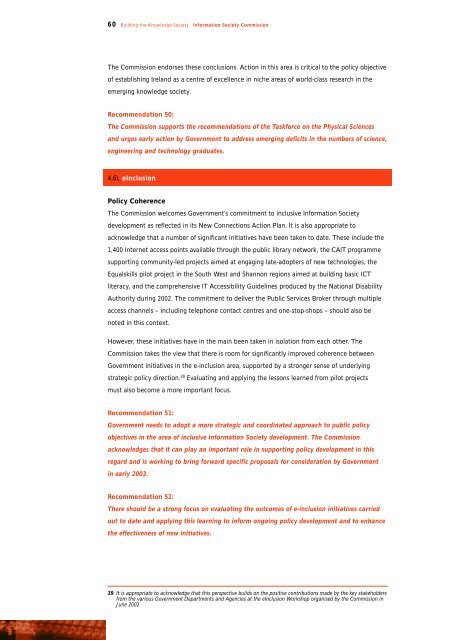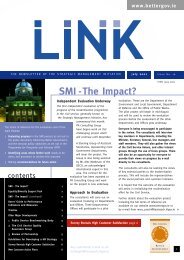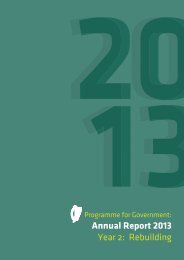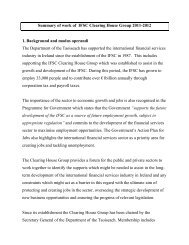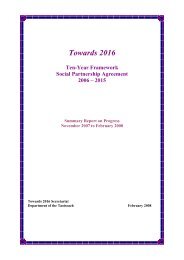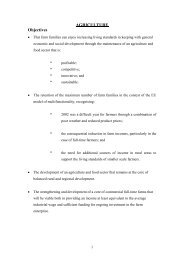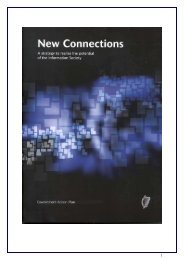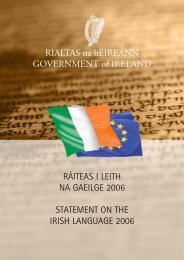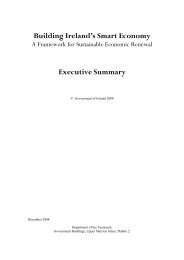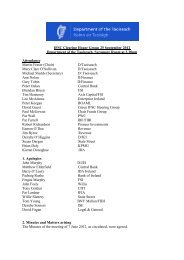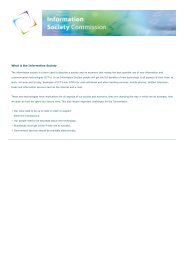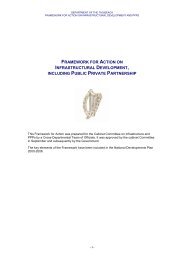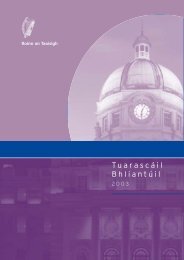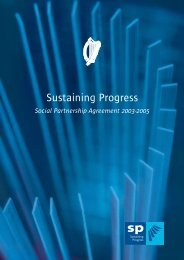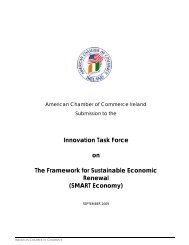Building the Knowledge Society - Department of Communications ...
Building the Knowledge Society - Department of Communications ...
Building the Knowledge Society - Department of Communications ...
You also want an ePaper? Increase the reach of your titles
YUMPU automatically turns print PDFs into web optimized ePapers that Google loves.
60 <strong>Building</strong> <strong>the</strong> <strong>Knowledge</strong> <strong>Society</strong> Information <strong>Society</strong> CommissionThe Commission endorses <strong>the</strong>se conclusions. Action in this area is critical to <strong>the</strong> policy objective<strong>of</strong> establishing Ireland as a centre <strong>of</strong> excellence in niche areas <strong>of</strong> world-class research in <strong>the</strong>emerging knowledge society.Recommendation 50:The Commission supports <strong>the</strong> recommendations <strong>of</strong> <strong>the</strong> Taskforce on <strong>the</strong> Physical Sciencesand urges early action by Government to address emerging deficits in <strong>the</strong> numbers <strong>of</strong> science,engineering and technology graduates.4.6\ eInclusionPolicy CoherenceThe Commission welcomes Government’s commitment to inclusive Information <strong>Society</strong>development as reflected in its New Connections Action Plan. It is also appropriate toacknowledge that a number <strong>of</strong> significant initiatives have been taken to date. These include <strong>the</strong>1,400 Internet access points available through <strong>the</strong> public library network, <strong>the</strong> CAIT programmesupporting community-led projects aimed at engaging late-adopters <strong>of</strong> new technologies, <strong>the</strong>Equalskills pilot project in <strong>the</strong> South West and Shannon regions aimed at building basic ICTliteracy, and <strong>the</strong> comprehensive IT Accessibility Guidelines produced by <strong>the</strong> National DisabilityAuthority during 2002. The commitment to deliver <strong>the</strong> Public Services Broker through multipleaccess channels – including telephone contact centres and one-stop-shops – should also benoted in this context.However, <strong>the</strong>se initiatives have in <strong>the</strong> main been taken in isolation from each o<strong>the</strong>r. TheCommission takes <strong>the</strong> view that <strong>the</strong>re is room for significantly improved coherence betweenGovernment initiatives in <strong>the</strong> e-inclusion area, supported by a stronger sense <strong>of</strong> underlyingstrategic policy direction. 39 Evaluating and applying <strong>the</strong> lessons learned from pilot projectsmust also become a more important focus.Recommendation 51:Government needs to adopt a more strategic and coordinated approach to public policyobjectives in <strong>the</strong> area <strong>of</strong> inclusive Information <strong>Society</strong> development. The Commissionacknowledges that it can play an important role in supporting policy development in thisregard and is working to bring forward specific proposals for consideration by Governmentin early 2003.Recommendation 52:There should be a strong focus on evaluating <strong>the</strong> outcomes <strong>of</strong> e-inclusion initiatives carriedout to date and applying this learning to inform ongoing policy development and to enhance<strong>the</strong> effectiveness <strong>of</strong> new initiatives.39 It is appropriate to acknowledge that this perspective builds on <strong>the</strong> positive contributions made by <strong>the</strong> key stakeholdersfrom <strong>the</strong> various Government <strong>Department</strong>s and Agencies at <strong>the</strong> eInclusion Workshop organised by <strong>the</strong> Commission inJune 2002


